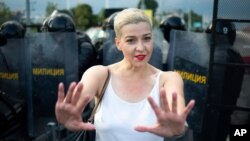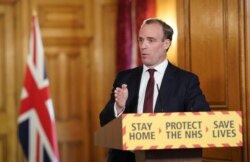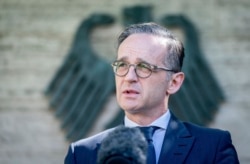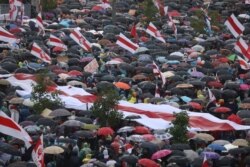Maria Kolesnikova, a leading member of Belarus' opposition, was reportedly seized Monday by unidentified men in Minsk, and Germany and Britain are demanding that President Alexander Lukashenko disclose where she is.
Germany's Foreign Minister Heiko Maas called for "clarity on the whereabouts and the release of all political prisoners in Belarus," in comments tweeted by the foreign ministry.
Dominic Raab, Britain's foreign secretary, tweeted: "Seriously concerned for the welfare of Maria Kolesnikova in #Belarus. Lukashenko's regime must make her safe return their highest priority. The regime must cease brutalising protestors, release political prisoners and begin dialogue with the opposition."
A witness identified as Anastasia told Belarusian website Tut.by Monday that she saw Kolesnikova being forced by men in civilian clothing into a minibus and driven away.
Kolesnikova is the last of three women left inside Belarus who came together in the opposition coordination council to try to defeat Lukashenko in the August 9 poll. He was declared winner in the election, but opposition parties, along with the United States and the European Union, say the poll was rigged.
Kolesnikova's ally Olga Kovalkova went to Poland on Saturday, saying authorities forced her out of the country, while Belarus' main opposition leader, Sviatlana Tsikhanouskaya, has been in Lithuania with her children since the election for what she says is her own safety.
Maas, the German foreign minister, also tweeted that the European Union is "working flat out on a sanctions package. If #Lukashenko does not change course, we will respond."
The EU is considering sanctions on 31 senior Belarus officials, Reuters reported Monday, citing three EU diplomats.
"The EU expects the Belarusian authorities to ensure the immediate release of all detained on political grounds before and after the falsified 9 August presidential elections," said its diplomatic head, Josep Borrell.
Further, the EU called Monday on Belarus to release the more than 600 people it said it arrested over the weekend for protesting what thousands of Belarusians believe was rigged elections.
"The EU will impose sanctions on individuals responsible for violence, repression and falsification of election results," Borrell added.
The demonstrations against Lukashenko entered their fifth straight week Sunday, again drawing tens of thousands of people into the streets, shouting slogans and waving red and white opposition flags.
More than 7,000 protesters have been arrested, and widespread evidence of abuse and torture has been reported in the month of protests. At least four people are reported to have died during the demonstrations.
In an interview with VOA, Tsikhanouskaya said she is working to organize new elections despite Lukashenko's refusal to do so.
"Our plan is absolutely clear. It's organization of new elections, fair and transparent," she said.
Lukashenko has been in power since 1994.








